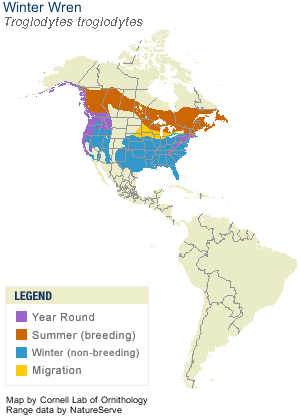
Winter Wren
Credit: Tom Vezo
(David posting again on behalf of Jeff) I was waiting for the bus today outside my neighborhood coffee shop in Seattle when something caught my eye. Typically arriving a few minutes early to ensure I don't miss my bus, I usually scan the headlines on the front pages of USA Today and the Seattle Times (the two papers offered by the bus stop) to see if anything exciting is happening in the news. Most days it revolves around partisan bickering on healthcare, a suicide bomb in Afghanistan, or a local teacher accused of misconduct with students.
Today, however, I was pleasantly surprised to find an expansive photo of a gorgeous Winter Wren (which Jeff blogged about this fall) taking up much of the front page in the Seattle Times. Excited and intrigued, my eyes quickly jumped to the text to see what it was about.
I don't know what was more refreshing: a break from the traditionally negative news cycle or the fact that a feature article about an amazing boreal breeder and its unique call would be shared with thousands of everyday folks around the area!

43% of Winter Wrens breed in the boreal forest
Credit: Matt Medler
The Winter Wren, as mentioned in the article, is small in size (weighing around 10 grams) but has an enormous voice. Ounce for ounce, a Winter Wren's voice is 10 times as powerful as a rooster. In addition, it has a particularly complex song, capable of singing up to 30 notes in just one second (in the western populations).
Here's a link to the full article - they also have a cool video slideshow of the Winter Wren as well:
Go to article >
Also, a previous BSI staff member, Matt Medler (now works at the Cornell Lab of Ornithology), was able to record a Winter Wren during an excursion into Ontario's Boreal Forest this past summer. Here is a link to listen to his recording, as well as a couple links to his guest blog posts about his trip (he was generous enough to share his experiences with us on our blog over the summer...including great photos!):
![]() Listen to his recording >
Listen to his recording >
Matt's first trip summary > Matt's second trip summary >
While Winter Wrens typically live year-round in my neck of the woods (Western Washington), the majority of Winter Wrens found in the Eastern and Southern United States are actually migratory boreal breeders, wintering in the warmer US to avoid Canada's chilly winters (and I can't blame them). However, they must be somewhat comfortable with cold weather, as they're some of the first to arrive in the boreal in the spring and some of the last to leave in the fall.
Here's their range map, courtesy of Cornell Lab's All About Birds website:


